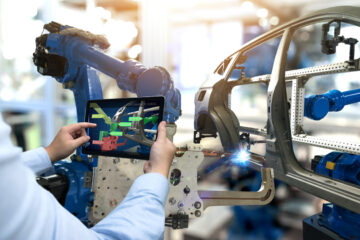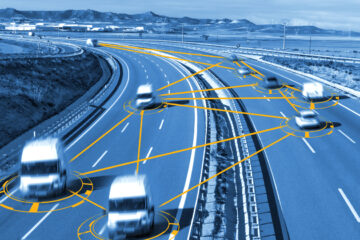Once a significant breakthrough in the financial industry, blockchain technology has moved into new territory, optimizing the food and beverage supply chain.
The food and beverage industry has long dealt with logistics issues such as data losses, fraud, and changing regulatory requirements that threaten the supply chain’s distribution, efficiency, food quality, and security. As blockchain technology advances, more food and beverage companies are utilizing a blockchain supply chain to streamline operations and communications.
Companies Integrating a Blockchain Supply Chain
Today’s most well-recognized businesses have integrated blockchain technology to boost their food and beverage supply chain. For example, Walmart Canada once endured a logistics nightmare as it attempted to transport 500,000 shipments across borders and different time zones. Additionally, nearly 70% of invoices were unreconciled, leaving carriers less than pleased with higher transaction fees.
Walmart Canada began integrating blockchain technology in early 2019 to automate its processes and capture and disseminate real-time data. Nowadays, Walmart Canada has reduced invoice discrepancies to less than 1%. Nestlé is also unlocking the potential of a blockchain supply chain to trace any food item from its origin to its current location, including details about its temperature logs, testing, and certification. Likewise, Europe’s Carrefour Bio recently began using a QR code to enable consumer access to food traceability and increase transparency.
5 Benefits of a Blockchain Supply Chain in the Food System
Consumers have the right to know that their food meets the most stringent safety standards for quality assurance. However, can they be sure that a ripened pear in seemingly good condition isn’t contaminated? The ability to simply scan a barcode and access crucial details about individual food items could be a game changer in an industry riddled with obstacles and inefficiencies. The blockchain supply chain is transforming the food industry’s functions and building consumer trust in our food system. Here are five ways food and beverage supply chains are getting a boost from blockchain technology.
1. Enhanced Traceability
Companies like Carrefour and Nestlé understand how consumer preferences have altered the global supply chain, emphasizing food safety and transparency with increased quality control. Blockchain technology is ultimately a distributed database in which stakeholders upload product information throughout every stage of the food and beverage supply chain, from livestock diets to preservation methods to ethical sourcing. Food traceability mechanisms then collect and store information for more convenient data management in delivering a safer food system. These further build partner and consumer trust, communication, accountability and honesty.
2. Increased Efficiency
According to the World Food Programme, all the food that never makes it to the market could feed 2 billion people. That’s twice the number of malnourished individuals worldwide. However, with inefficient supply chain coordination, producers often watch their harvest go to waste.
Blockchain technology’s product traceability exponentially decreases the potential for human error, as data becomes digitized in the cloud. For instance, blockchain aggregates information logs and automatically updates supply chain partners with data tracking and accurate insights. Furthermore, blockchain technology reinforces the global supply chain communication network using the internet of things (IoT). Thus, food and beverage blockchain supply chains improve coordination and the transport of goods.
3. Food Safety
Consumers rely on expiration dates to make safer food purchasing decisions. Yet, discrepancies and misunderstandings around food labels pose significant problems concerning food safety in the supply chain. Every year, about 600 million people get sick from eating contaminated food 420,000 die as a consequence, with children under 5 bearing the greatest burden of foodborne illnesses.
One might consider that food safety is first compromised during harvesting. For example, produce attached to its plant maintains regulated enzymes and macronutrients. Once cut, the damaged outer skin and tissues disrupt the cell membranes and induce faster expiration. With advanced IoT components in the blockchain supply chain, the food and beverage industry can better monitor healthy food conditions, including growing environments, use of fertilizers and pesticides, harvesting times, storage facilities, transportation, and even workers’ health.
4. Improved Security
When cybercriminals set their eyes on the United States’ food industry in May 2021, they went after JBS USA – a subsidiary of Brazil’s JBS SA. It processes 20% of the nation’s meat supply, but hackers temporarily closed the company’s plants and processing facilities. Later that summer, hackers demanded Iowa-based agrarian company New Cooperative pay a ransom of $5.9 million for a decryptor key, threatening to publish sensitive information from the company’s internal systems.
Fortunately, blockchain technology makes the food and beverage supply chain relatively impenetrable, preventing critical logistics disruptions. It does this by deploying multi-authentication and complex digital pathways that hackers must bypass to access the databases. Although blockchain isn’t totally resilient to increasingly sophisticated hacking attempts, advancements in artificial intelligence (AI) are delivering backup solutions for greater IT security.
5. Optimal Customer Satisfaction
There are many ways in which blockchain increases customer satisfaction in the food and beverage industry. Those concerned about quality assurance and food safety gain better control over what they buy and eat. Transparency goes a long way with consumers. When people think about the industry’s practices and environmental impact, access to adequate product tracking can boost trust and brand loyalty. Additionally, having fewer hiccups in inefficient and insecure logistics management reduces disruptions and ensures stable distribution and product availability.
The Blockchain Supply Chain Improves Our Food System
Now that some of the major players in global food enterprises have integrated blockchain into their logistics strategies, it’s likely it’ll become a standard component of the food and beverage supply chain. Stakeholders and consumers can expect greater efficiencies and consistency in the food system with blockchain supply chains.
About the author:


Emily Newton is the Editor-in-Chief of Revolutionized Magazine.
Emily Newton is the Editor-in-Chief of Revolutionized Magazine. She has over six years covering stories about warehousing, logistics and distribution.
- SEO Powered Content & PR Distribution. Get Amplified Today.
- Platoblockchain. Web3 Metaverse Intelligence. Knowledge Amplified. Access Here.
- Source: https://www.allthingssupplychain.com/blockchain-gives-a-big-boost-to-food-and-beverage-supply-chains/?utm_source=rss&utm_medium=rss&utm_campaign=blockchain-gives-a-big-boost-to-food-and-beverage-supply-chains
- 000
- 2019
- 2021
- 420
- 7
- 9
- a
- ability
- About
- access
- accountability
- accurate
- across
- Additionally
- advanced
- advancements
- advances
- After
- AI
- All
- Although
- and
- around
- artificial
- artificial intelligence
- Artificial intelligence (AI)
- assurance
- attempted
- Attempts
- author
- automate
- automatically
- availability
- Backup
- become
- becomes
- began
- benefits
- Better
- BEVERAGE
- Big
- Billion
- blockchain
- blockchain technology
- boost
- brand
- brand loyalty
- breakthrough
- build
- Building
- burden
- businesses
- buy
- Canada
- capture
- carriers
- Certification
- chain
- chains
- Changer
- changing
- Children
- closed
- Cloud
- code
- collect
- Communication
- Communications
- Companies
- company
- Company’s
- complex
- component
- components
- Compromised
- concerned
- condition
- Consider
- consumer
- Consumers
- control
- Convenient
- cooperative
- coordination
- could
- covering
- critical
- crucial
- Current
- customer
- Customer satisfaction
- Cut
- cybercriminals
- data
- data management
- Database
- databases
- Dates
- decisions
- delivering
- demanded
- details
- Die
- different
- digital
- digitized
- disruptions
- distributed
- distribution
- during
- Early
- eat
- editor-in-chief
- efficiencies
- efficiency
- enable
- enhanced
- ensures
- enterprises
- environmental
- environments
- error
- ethical
- Europes
- Even
- example
- expect
- exponentially
- Eyes
- faster
- Fees
- financial
- First
- food
- Forbes
- fraud
- from
- functions
- further
- Furthermore
- Gain
- game
- game-changer
- get
- getting
- gives
- Global
- Go
- Goes
- good
- goods
- greater
- greatest
- Growing
- hackers
- hacking
- harvest
- Harvesting
- having
- Health
- healthy
- here
- higher
- How
- However
- HTTPS
- human
- Impact
- improve
- improved
- improves
- in
- Including
- Increase
- increased
- Increases
- increasingly
- individual
- individuals
- industry
- industry’s
- inefficient
- information
- insights
- instance
- integrated
- Integrating
- Intelligence
- internal
- Internet
- internet of things
- iot
- issues
- IT
- it security
- items
- Key
- Know
- leaving
- likely
- location
- logistics
- Long
- losses
- Loyalty
- magazine
- maintains
- major
- make
- MAKES
- management
- many
- Market
- Meat
- Meets
- methods
- might
- million
- more
- most
- Nations
- nearly
- network
- New
- Newton
- number
- obstacles
- Operations
- optimal
- optimizing
- partner
- partners
- Pay
- People
- plants
- plato
- Plato Data Intelligence
- PlatoData
- players
- pleased
- potential
- practices
- preferences
- preventing
- problems
- processes
- processing
- produce
- Producers
- Product
- Product information
- programme
- publish
- purchasing
- QR code
- quality
- real-time
- real-time data
- recently
- Reduced
- reduces
- regulated
- regulatory
- relatively
- Requirements
- resilient
- revolutionized
- SA
- safer
- Safety
- satisfaction
- scan
- security
- sensitive
- set
- significant
- simply
- SIX
- Skin
- Solutions
- some
- sophisticated
- stable
- stakeholders
- standard
- standards
- storage
- store
- Stories
- strategies
- streamline
- subsidiary
- such
- summer
- supply
- supply chain
- Supply chains
- system
- Systems
- Technology
- Testing
- The
- the world
- their
- things
- threaten
- throughout
- time
- times
- tissues
- to
- TOTALLY
- Traceability
- Tracking
- transaction
- Transaction Fees
- transforming
- Transparency
- transport
- transportation
- Trust
- Ultimately
- under
- understand
- United
- unlocking
- Updates
- USA
- use
- Utilizing
- VOX
- Walmart
- Warehousing
- Waste
- Watch
- ways
- What
- which
- WHO
- world
- World Food
- worldwide
- year
- years
- zephyrnet
- zones











